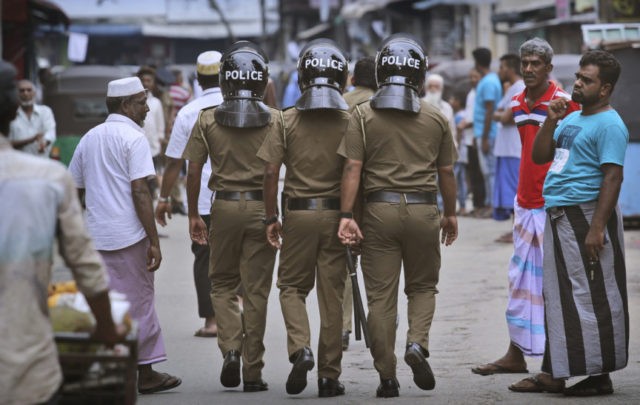Sri Lankan police struggled to keep up this weekend with a series of mob attacks on mosques, the latest occurring Monday, in retaliation for a series of suicide bombings on Easter that killed over 350 people. The assailants are believed to belong to the country’s Buddhist majority.
The Colombo Telegraph reported Monday that President’s Counsel Mohamed Ali Sabry used Facebook to offer a public tally of the number of attacks that morning outside of the capital. The attacks allegedly occurred while the government had imposed a curfew.
“3 mosques, 1 jumma mosque and 2 small mosques were attacked and pillaged in Kiniyama, Bingiriya in Kurunegala District while curfew was in place this early morning,” Sabry reportedly wrote. “This is getting out of hand. Enough racism. It’s not going to solve the issues but further escalate it.”
Prior to these attacks, Reuters reported that authorities had imposed a curfew in the first place in response to a string of attacks against mosques and other locations frequented by Muslims. In at least one case, police said they arrested the suspected assailants but “people in the mostly Buddhist district [of Kurunegala] then demanded their release.” Buddhist monks called for the investigation of a local mosque in one instance shortly before the attacks.
The attacks consisted almost exclusively of vandalism: broken windows, damaged bicycles parked outside one of the mosques, and Qurans left strewn on the ground in some mosques, an act of disrespects that in some Muslim-majority countries would trigger prosecution.
In Sri Lanka, however, the attacks prompted a nationwide shutdown of social media. Some of the attacks, Reuters claimed, began with disputes on Facebook and Whatsapp that erupted in real life. In western Sri Lanka, a mob threw stones at a mosque after a local Muslim identified as Abdul Hameed Mohamed Hasmar posted the message “1 day u will cry” on Facebook which, in the aftermath of the Easter bombings, some believed was a veiled reference to a jihadist plot.
Jihadists associated with the Islamic State killed over 250 on Easter and injured over 500 others, targeting three churches and three hotels serving Easter breakfast outside of Colombo. Eyewitnesses said that, in at least one of the church attacks, the jihadists targeted children by detonating towards the back of the church, where parents tend to stay so it is possible to make a quick exit if the child becomes unruly or loud. The suspected mastermind of the attack, Mohamed Zahran Hashim, appeared in an Islamic State video shortly after praising “caliph” Abu Bakr al-Baghdadi, who himself resurfaced on video for the first time since 2014 following the attacks. Several individuals suspected of participating in the planning of the bombings committed suicide when confronted by police.
The government of Sri Lanka has responded to the attacks by slowly attempting to curb radical Islam in the country. While the Muslim population of Sri Lanka is about seven percent, nearly equal to the Christian population, authorities deported 200 foreign imams in the country this month for being in the country illegally after their visas expired, and another 600 people authorities believe could be terror threats are allegedly in the process of being expelled. The government also banned Islamic face veils in the wake of attacks and, this weekend, began implementing strict regulations on content disseminated in mosques.
“The government on Friday ordered mosques to clamp down on extremists and to submit copies of sermons in new fallout from the Easter suicide bombings that left 258 dead,” the Sri Lankan outlet Ada Derana reported.
“In view of the prevailing situation in the country, the ministry directs all trustees of mosques not to engage in or permit any gathering to promote or propagate hatred or extremism in any form,” a statement from Sri Lanka’s Ministry of Muslim Religious and Cultural Affairs read.
The government has also ordered police to raid several mosques in the aftermath of the attacks, including the mosque used by National Thowheed Jamath (NTJ), the Muslim radical group led by Zahran Hashim. Shortly after the Easter bombings, local media revealed that as many as 11 mosques in the area hosting the NTJ mosque preached “fundamentalism” or “Wahhabism,” a specific brand of Saudi extremist Islam. Police have continued to find weapons caches including swords, shotguns, rifles, and other firearms in several mosques in and around Colombo.

COMMENTS
Please let us know if you're having issues with commenting.